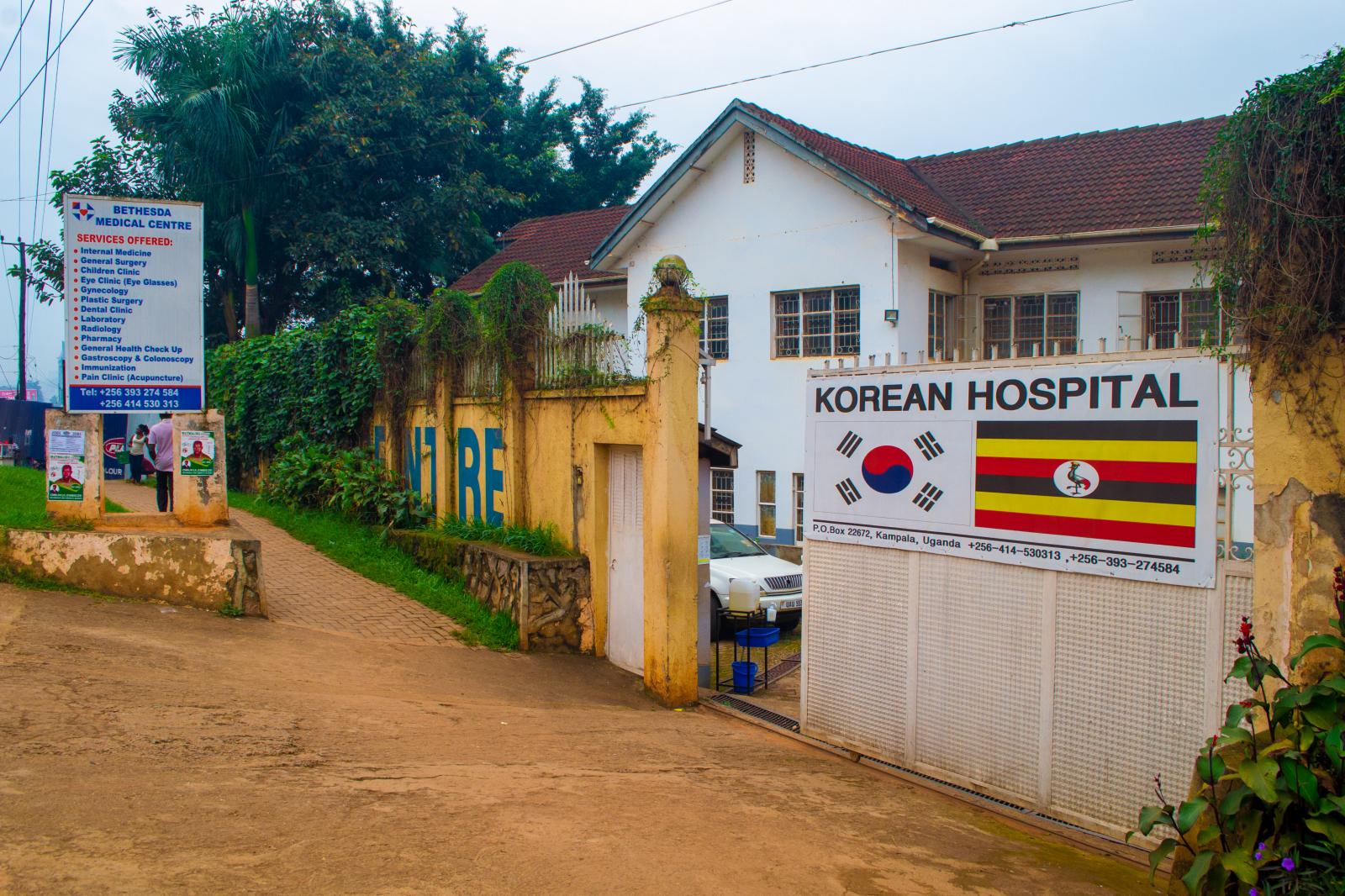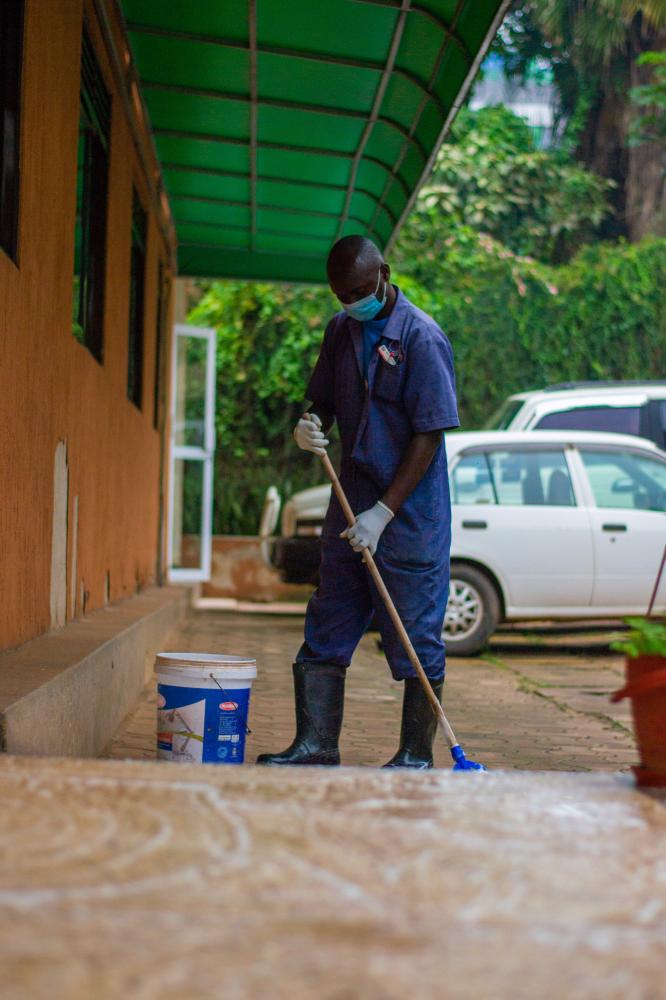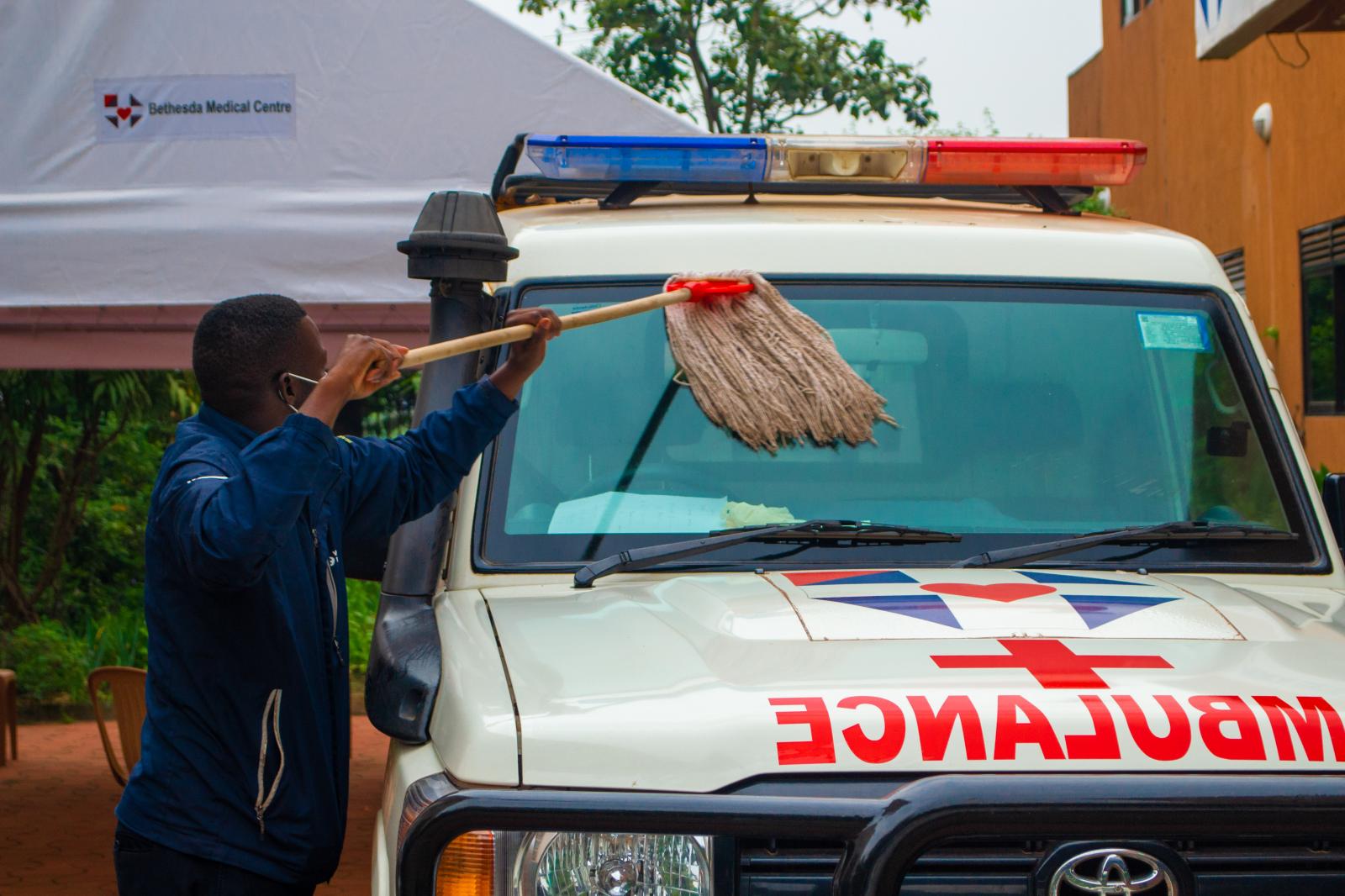Timothy Akolamazima
A photo documentary on how frontline health workers are adjusting to the new normal amidst the COVID-19 Pandemic
By Timothy Akolamazima
The objective of this proposal is to document health workers the Korean Hospital (also known as Bethesda Medical Centre) and their experience in the provision of health care services amidst the COVID-19 pandemic. Health workers mainly involve nurses who give supportive services to both doctors and patients; cleaners responsible for the maintenance of good hygiene in the hospital; the receptionists; the pharmacists and the doctors themselves. The Korean Hospital is located at Makerere Hill Road Plot 11, Kampala Uganda opposite the Makerere Main Gate. The hospital medical services include general surgery, plastic surgery, orthopedic surgery, internal medicine, gynaecology, dentistry, pediatrics, pain clinic and ophthalmology. The Korean Hospital is mostly popular for its specialist eye clinic which also provides cataract and glaucoma surgery.
Uganda recorded its first case of the Corona Virus in March 2020. In the early stages of the pandemic, most cases were identified at the borders, among people crossing to Uganda from other countries. Since then, however, the country has seen a rapid increase in COVID-19 community transmission and clusters of infection nationwide. As of July 2021, Uganda’s Ministry of Health had recorded 89,514 cases and 2,286 deaths.
The Uganda government has worked hard to develop plans to protect its population but implementation has been hampered by a lack of resources and expertise. The efforts required to contain COVID-19 are straining an already overstretched health system. As Uganda’s hospitals experience an influx of patients, there is an increasing risk of hospital acquired infection by health workers. Indeed the high number of new infections is making it difficult for the health system to care for both COVID-19 and non COVID-19 patients let alone execute critical activities such as laboratory testing, vaccination against COVID-19, investigation and contact tracing.
In Uganda, as community transmission of COVID-19 and related death continue to rise, health facilities are taking additional precautionary measures to protect health workers and patients. At the Korean Hospital in Kampala face-masks are mandatory for patients and attendants accessing the facility. Without a mask, a person is turned back. On arrival the, first thing is to wash one’s hands at a washing station located right beside the main gate; then one’s temperature is checked.
The hand washing facilities are positioned at critical points in the facility such as the main entrance to ensure patients wash their hands. There also sanitizing points scattered within the hospital and social distancing too is strictly observed. Patients sit one sit apart from each other and their body temperatures are rechecked along with blood pressure before giving them more services. Activities at the Hospital have never stopped despite the crisis. On average, the facility attends to about 200 patients per day. With these large numbers, one only wonders how the health workers are managing to keep safe during the pandemic
A quick glance around the hospital compound, and all workers in sight, cleaners and health workers alike are wearing protective gear. They have masks and aprons on and will grab a pair of gloves whenever they are in contact with patients. The cleaners have heavy duty gloves and gum boots to support their work.
The health workers in the Eye Clinic are very busy given that the Korean Hospital is popular for its outstanding Eye Care Services and the free community based cataract and glaucoma surgery services.
One of the health works I met is Nurse Anna Mary Namakoye; the nurse in charge. She oversees the Eye Clinic at the facility and supervises 6 nurses. She confirmed that the priority right now is the safety of her staff, herself and their patients. When asked how she ensures her staff members are safe this is what she had to say;
“Every morning we clean the hospital which involves sanitizing door handles, surfaces, sits where patients sit, the office floor which is done by cleaners. I also move around the hospital to ensure all hand washing points are functional and have clean water with soap. I also ensure that all work stations have temperature guns and sanitizers. My main concern as a nurse is our safety since we work directly with patients, whereby usually, social distance is not an option. Patients don’t tell us their symptoms, some don’t even want to tell us that they tested positive with COVID-19. So, the best I can do is to sanitize after working on a patient and also keep my mask on. I also encourage my fellow nurses to keep precautionary measures such as maintaining social distance, despite the overwhelming number of patients and their attendants and sanitizing every now and then and keeping their mask on” Anna Mary Says
Despite the zeal and enthusiasm that Anna Mary exhibits during her work she has her fears. She is worried with laxity among some patients; COVID-19 will slowly close in.
Chebijira Sisco is another health care worker I met who is both a receptionist and Cashier at the Korean Hospital. She interfaces with the patients first before any health worker attends to them. On asking her how she was adjusting to the new normal and ensuring to keep safe while on duty, this is what she had to say
“Most patients don’t seem to be aware of the SOPs such as sanitizing and wearing of masks. Some know just tell lies and are arrogant. Some go without even getting the health services just because you’ve told them to wash hands. For purposes of keeping safe I sanitize my work station every morning and also had to request the hospital to install plastic barriers between me and the patients since some patients don’t want to social distance” say Chebijira Sisco
Musinguzi Erasmus is another nurse I met during the course of the photo documentary and this is what he had to say regarding adjusting to the new normal.
“The Personal Protective Equipments (PPEs) especially masks are not fully supplied either so sometimes we have to buy for ourselves to keep safe on duty” says Erasmus
The main target of the project in terms of audiences is Kampala Capital City Authority (KCCA), Ministry of Health (MoH) and Non Governmental Organisations (NGOs) that should play a major role in combating the spread of COVID-19 among health workers, such as Infectious Disease Institute (IDI) at Makerere University, Ukaid’s Tackling Deadly Disease in Africa (TDDA), African Field Epidemiology Network (AFENET). There is an urgent need to support the COVID-19 response in Uganda. Initiatives set forward should target the protection of health workers through provision of Personal Protective Equipment (PPEs) such as masks, gloves, sanitizers along with training and mentoring health workers on how to keep safe on the job. There is also need to strengthen COVID-19 response through home-based care and community based care.
The general public also needs to understand the life experience of health workers at the frontline. Telling their story could evoke empathy, hence, more compliance with Standard Operating Procedures (SOPs) such as putting on masks, sanitizing and distancing, on visiting health care centers
MOTIVATIONAL LETER
My name is Akolamazima Timothy. I graduated with a Bachelor of Science in Population Studies of Makerere University. I am seeking to participate in the Young Photographers Award 2021 as adverstised on the UPPA and Visura. co website. It is important that Ugandans horn the skill of telling stories of their communities through their lens. It is upon this motivation that I seek to participate in this award in order to become a better visual story teller.
I am in the process of learning the art of Photography. I initially began with teaching myself the basics of photography such as the anatomy of the camera, exposure and composition techniques. During the on-set of the COVID-19 lockdown in 2020, I enrolled for a short one-month’s course in Visual Story Telling with UPPA which introduced me to photojournalism and documentary photography as a profession. It is upon this background that I got interested in participating in the Young Photographers award.
On a personal level, I am a highly self-driven person and I seek to learn more about photography ceasing every available opportunity presented to me. Participating in this award comes with an opportunity of mentorship an achievement that will go a long way in helping me to improve my skills. In my project for the award, I am looking at how frontline health workers are adjusting to the new normal amidst the COVID-19 Pandemic. Case in point are the health workers at the Korean Hospital (also known as Bethesda Medical Centre) located at Makerere Hill Road Plot 11, Kampala Uganda opposite the Makerere Main Gate.
I am zealous on winning the Young Photographers award and be mentored on how to accomplish documentary projects of such nature that tell the stories of others in my community. I am looking forward to learning and practicing what I will learn from the mentors; an opportunity in building a firm portfolio in line with becoming a successful documentary photographer
Thank you for considering my photography project
Yours Sincerely,
Timothy Akolamazima

The Korean Hospital (also known as Bethesda Medical Centre) is located at Makerere Hill Road Plot 11, Kampala Uganda opposite the Makerere Main Gate. The hospital medical services include general surgery, plastic surgery, orthopedic surgery, internal medicine, gynaecology, dentistry, pediatrics, pain clinic and ophthalmology.

Dragule Emmanuel is a cleaner at the Korean Hospital. He is responsible for the general cleanliness of the hospital. In the morning, the first thing he does is to mop the hospital floor, the verandah and the washrooms. To keep safe while on duty, he puts on a pair of gloves, wears a mask and heavy duty gum boots.

Akiso Jude, an ambulance driver at the Korean Hospital takes time off to clean the ambulance before the start of the day. He is in charge of transporting any patient on referral to another hospital.

Anna Mary Namakoye the nurse in charge at the Korean Hospital cleans a wheel chair. She supervises the cleaning of the hospital and ensures in the morning that all nurses and hospital staff clean their work stations before opening up to patients. She leads by example as she also participates in the cleaning. While cleaning, she uses gloves and has her mask on.


Chebijira Sisco, a receptionist at the Korean Hospital cleans her work station. To ensure she keeps safe at work, she also has a mask on and uses a pair of disposable gloves while cleaning To ensure social distancing between her and the patients, the hospital installed plastic barriers.


Laura Aguti, a nurse in a tent pitched at the entrance checks the temperature of a patient before accessing the health facility. Temperature checks with an infrared thermometer is one of the Standard Operating Procedures (SOPs) put in place to minimize risk of spread of COVID-19.

Kizito Simon Peter, a nurse at the Korean Hospital records important information about patients accessing the facility in a record book. This includes the name, age, area of residence, patient’s contact, contact of next of kin and temperature recorded after temperature check. This information is used by the hospital in case of an emergency and contact tracing. The information is also entered in the hospital database and used for future referrals and patient follow up

Chebjira Sisco a receptionist at the Korean Hospital attends to a patient through a clear plastic barrier. Installation of the plastic barriers is aimed at keeping a distance between the patient and receptionist during inquiries. It also helps patients feel safe and access health services when such protective measures are put in place in light of the COVID-19 pandemic.

Before a patient gets further medical attention from the doctors, their blood pressure is measured and their temperature re-measured. Laura Aguti checks the body temperature and blood pressure of a patient. Since high blood pressure has no symptom, when patients visit the health facility, a routine check of blood pressure is performed to ensure their health status.

Seats in the waiting lounge at the Korean Hospital are labeled informing patients to have one free seat between them. This is aimed at ensuring that patients observe social distancing as they wait for services from health workers.

With masks on, father and son sit apart as they wait for a doctor at the Korean Hospital.

After doing routine checks on a patient, Anna Mary enters the patients details in the hospital database. The details entered include, patient’s name, contact, age, area of residence, blood pressure at the time of visit, temperature and body weight. These details are used for further referral and patient follow up on future visits.

One of the medical services offered at the Korean Hospital is ophthalmology. Anna Mary helps a patient read the eye chart by pointing on the letters. Results from this chart help the ophthalmologist in determining whether a patient may need eye glasses or not depending on what they can read off the Eye Chart.

A patient at the Eye Clinic at the Korean Hospital closes one eye and reads the Eye Chart as directed by nurse Anna Mary.

After the routine checks, performed by the nurse, Anna Mary calls in the ophthalmologist for further eye examination. In case of inquiries or patients making appointments via phone call, Anna Mary is the one in charge of helping with scheduling appointments for the doctors.

Dr Rebekah Choi the Head of Opthamology at the Korean Hospital further examines the patient’s eyes through a phoropter. The phoropter is used during eye examination to measure refractive error and determine eye glass prescriptions. Anna Mary, the nurse helps the patient to position his head properly on the phoropter.

After examination on the Phoropter, Anna Mary instructs the patient on what to do during examination at the Henson 9000 Visual Field Screener. In the eye clinic, this medical instrument is used for glaucoma screening and management.

With the patients chin rested on the Henson 9000 Visual Field Screener, Anna Mary monitors the screening progress on the laptop connected to the visual field screener. Results from this machine further help the Ophthalmologist to determine the prescription to the patient.
